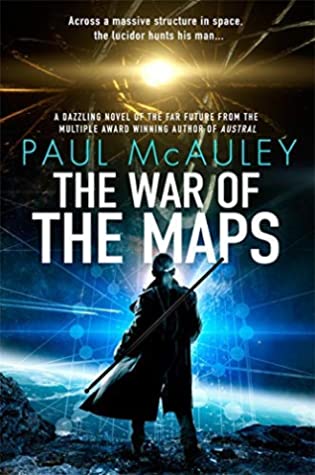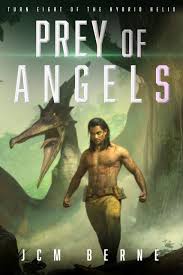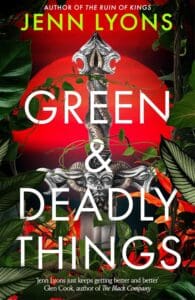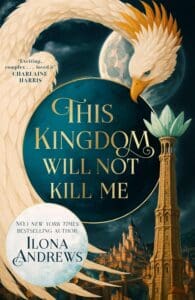Rating: 10/10
Synopsis
On a giant artificial world surrounding an artificial sun, one man – a lucidor, a keeper of the peace, a policeman – is on the hunt. His target was responsible for an atrocity, but is too valuable to the government to be truly punished.
Instead he has been sent to the frontlines of the war, to use his unique talents on the enemy. So the lucidor has ignored orders, deserted from his job, left his home and thrown his life away, in order to finally claim justice.
Separated by massive seas, the various maps dotted on the surface of this world rarely contact each other. But something has begun to infiltrate the edges of the lucidor’s map, something that genetically alters animals and plants and turns them into killers.
Only the lucidor knows the depths to which his quarry will sink in order to survive, only the lucidor can capture him. The way is long and dangerous. The lucidor’s government has set hunters after him. He has no friends, no resources, no plan. But he does have a mission.
Review
Thank you to Will and Gollancz for providing me an ARC. All thoughts are my opinion.
This is bascially Witcher inspired in a dystopian world that has a mutated world where the Advanced civilisation left this world that they created and featuring giant spider crabs?
Yes. This novel has spider-crabs.
Enough said.
This novel is the equivalent of CD PROJEKT RED spending their well earned reputation to make a fantastic game like Cyberpuk 2077. They spend their time planning, writing etc. This novel was like playing a triple AAA Game with fantastic descriptions and a lot of well written side-quests developed by a great team of developers and Paul was the game director of it.
The Wars of the Maps is the combination of what the Witcher of Rivia would look like if he time-traveled into the 21st century. It’s Witcher III the video game combined with Assassin Creed III. These are the video-game examples of what I’m comparing too. Because this novel has such a cinematic feel to the lush and dark environments of this world, it is amazing.
This book spans multiple oceans, spider crabs (yes. You heard it right. Spider crabs and mutated fish and leviathans) with a man that’s looking for really…a journey of his own redemption. The Lucidor is an old man, but I just couldn’t help but imagine him reading in Geralt’s voice. He’s funny, he’s smart, and above all, he has a very dry sense of humor. Needless to say, this world is dangerous with rival kingdoms fighting against each other, separated across vast distances of oceans. There are endless deserts, lush mountain scenery that reminded me of North America for some reason.
And the poor Lucidor, as you will instantly guess: is mired into the political trappings of everyone trying to make a living for themselves. There are foolish characters. There are brave characters. Some characters should have in my opinion, stayed for longer. Cyf is a character that I wished to see more off, as a slight criticism for me. The plot itself resembles something like a Spanish Expedition into the New World. You’ll soon see that during the novel. This world has elements of steam-punk, but there’s not much steam in it. There’s the whole history of the First Peoples (as I’ve seen this being used in many novels, let’s call them the advanced civilization, an apt example would be the High Elves in the Old World of Warhammer) and the novel is really centered around discovering what they did. Why did these Gods leave this artificial world that they had created?
There are historical references that are really well hidden. I guess you’ll find them, but it is hard to judge – its the context really. This novel is slow-paced, and it really picks up during the later stages. The reason for this is two-fold. One, this is a novel setting up the world. And two,
Many historical references are really well hidden. I guess you’ll find them, but it is hard to judge – its the context really. This novel is slow-paced, and it really picks up during the later stages. The reason for this is two-fold. One, this is a novel setting up the world. And two, most fantasy novels in their first stages can be either setting up the character through the world or setting up the world and then exploring the character’s motives. It’s a tricky situation for writers when they do this. Because you want a world where the reader has to be interested in every single element of world-building. You can’t go 100% Tolkein and write an entire bible because that’s not important. The world-building in this novel is VERY crucial. It’s drip-fed and doesn’t feel that imposing. I would say some areas did rely a little too much on describing some elements of the story. But if you want to know more about this advanced civilization, then I urge you to read it. The world has very clear references to what human nature can do to destroy nature, and you’ll see nature fighting back. There are diseases, mutations, etc. It would take me a lot of time to describe it.
The writing is amazing, the prose stunning, the worldbuilding on an awesome scale. I think it’s a great novel. Fantastic work. Fantastic descriptions. And this novel has characters that serve their purpose.
Overall, a great read, and def worth buying.





Leave a Reply